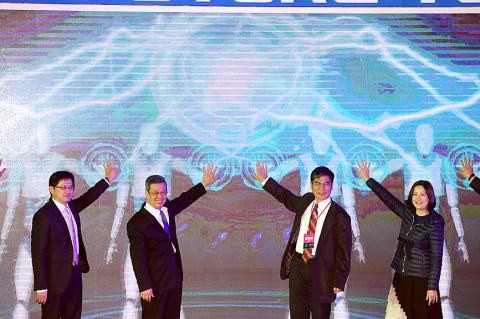The Future Tech exposition next month is to showcase 88 cutting-edge technologies, including 11 inventions, Minister of Science and Technology Chen Liang-gee (陳良基) said yesterday, forecasting that the four-day show would attract up to 100,000 visitors.
Scheduled to take place from Dec. 5 to Dec. 8 at the Taipei World Trade Center, the third annual exhibition is to present technologies developed by academics that show a spirit of “disruptive innovation,” Chen told a news conference in Taipei.
The 88 technologies — selected out of more than 500 applications — relate to artificial intelligence (AI) and the Internet of Things, electronics and optoelectronics, smart machinery and new materials, biotechnology and new medicine, medical materials, smart disaster prevention, semiconductor applications, sports training and space technology, he said.

Photo: CNA
A team named iTech has developed the first commercialized radio frequency front-end module for wireless positioning under the leadership of National Taiwan University’s Graduate Institute of Communication Engineering professor Mao Shau-gang (毛紹綱), who secured a US$5 million order for the module at the Viva Technology show in Paris in May.
Using the module, the team’s three products — iShield, iPosition and iFollow — can detect uncrewed aerial vehicles, identify the position of moving objects and track driverless machines, Mao said.
The team has reached out to companies involved in robotics, healthcare and automobiles in Taiwan, the US and Europe, and plans to start a firm next year, he said.
National Chiao Tung University electrical and computer engineering professor Chiou Jin-chern (邱俊誠) led another team in a nine-year effort to develop contact lenses with sensing circuits that can measure eye moisture, temperature and drug efficacy.
Featuring gold-made circuits, the lenses are made of hydrogels and embedded with a Taiwan Semiconductor Manufacturing Co (TSMC, 台積電) chip measuring 1.2mm2, he said.
While Google had failed in its attempt to produce similar contact lenses for monitoring blood sugar levels, the team has succeeded in producing smart contacts, which are to undergo clinical testing soon, he added.
Taipei Computer Association chairman Tung Tzu-hsien (童子賢) was upbeat about the outlook for small and medium-sized AI products, especially those used in healthcare, saying academic achievements do not have to be kept in an ivory tower.
Future Tech helps to shape an atmosphere that encourages students to get involved in technological innovations, so the nation’s advancement is not merely driven by top-down policy, Tung added.

Tropical Storm Gaemi strengthened into a typhoon at 2pm yesterday, and could make landfall in Yilan County tomorrow, the Central Weather Administration (CWA) said yesterday. The agency was scheduled to issue a sea warning at 11:30pm yesterday, and could issue a land warning later today. Gaemi was moving north-northwest at 4kph, carrying maximum sustained winds near its center of up to 118.8kph and gusts of 154.8kph. The circumference is forecast to reach eastern Taiwan tomorrow morning, with the center making landfall in Yilan County later that night before departing from the north coast, CWA weather forecaster Kuan Shin-ping (官欣平) said yesterday. Uncertainty remains and

SEA WARNING LIKELY: The storm, named Gaemi, could become a moderate typhoon on Wednesday or Thursday, with the Taipei City Government preparing for flooding A tropical depression east of the Philippines developed into a tropical storm named Gaemi at 2pm yesterday, and was moving toward eastern Taiwan, the Central Weather Administration (CWA) said. Gaemi could begin to affect Taiwan proper on Tuesday, lasting until Friday, and could develop into a moderate typhoon on Wednesday or Thursday, it said. A sea warning for Gaemi could be issued as early as Tuesday morning, it added. Gaemi, the third tropical storm in the Pacific Ocean this typhoon season, is projected to begin moving northwest today, and be closest to Taiwan on Wednesday or Thursday, the agency said. Today, there would likely

DISRUPTIONS: The high-speed rail is to operate as normal, while several airlines either canceled flights or announced early departures or late arrivals Schools and offices in 15 cities and counties are to be closed today due to Typhoon Gaemi, local governments announced last night. The 15 are: Taipei, New Taipei City, Taoyuan, Tainan, Keelung, Hsinchu and Kaohsiung, as well as Yilan, Hualien, Hsinchu, Miaoli, Chiayi, Pingtung, Penghu and Lienchiang counties. People should brace for torrential rainfall brought by the storm, with its center forecast to make landfall on the east coast between tonight and tomorrow morning, the Central Weather Administration (CWA) said. The agency issued a sea warning for the typhoon at 11:30pm on Monday, followed by a land warning at 11:30am yesterday. As of

CASUALTY: A 70-year-old woman was killed by a falling tree in Kaohsiung as the premier warned all government agencies to remain on high alert for the next 24 hours Schools and offices nationwide are to be closed for a second day today as Typhoon Gaemi crosses over the nation, bringing torrential rain and whipping winds. Gaemi was forecast to make landfall late last night. From Tuesday night, its outer band brought substantial rainfall and strong winds to the nation. As of 6:15pm last night, the typhoon’s center was 20km southeast of Hualien County, Central Weather Administration (CWA) data showed. It was moving at 19kph and had a radius of 250km. As of 3pm yesterday, one woman had died, while 58 people were injured, the Central Emergency Operation Center said. The 70-year-old